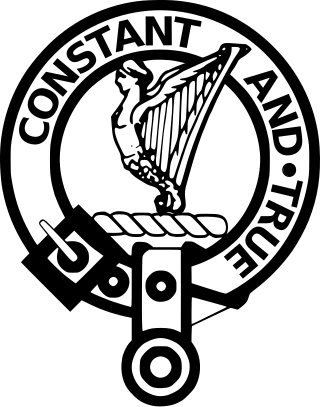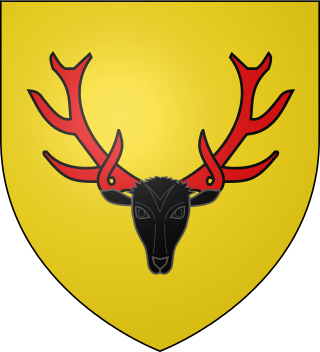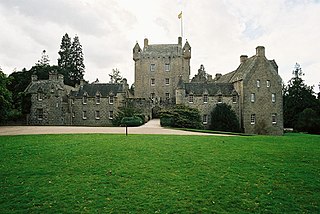
Earl Cawdor, of Castlemartin in the County of Pembroke, is a title in the Peerage of the United Kingdom. It was created in 1827 for John Campbell, 2nd Baron Cawdor.
The Lord Lieutenant of Nairn, is the British monarch's personal representative in an area which has been defined since 1975 as consisting of the local government district of Nairn, in Scotland, and this definition was renewed by the Lord-Lieutenants (Scotland) Order 1996. Previously, the area of the lieutenancy was the county of Nairn, which was abolished as a local government area by the Local Government (Scotland) Act 1973. The district was created, under the 1973 act, with the boundaries of the county, as a district of the two-tier Highland region and abolished as a local government area under the Local Government (Scotland) Act 1994, which turned the Highland region into a unitary council area.

Nairnshire was a county constituency of the House of Commons of Great Britain from 1708 until 1800, and of the House of Commons of the United Kingdom from 1801 to 1832.

Clan Rose is a Scottish clan of the Scottish Highlands.

Kilravock Castle is located near the village of Croy, between Inverness and Nairn, in the council area of Highland, Scotland. It was begun around 1460 and has been the seat of the Clan Rose since that time. The castle is a composite of a 15th-century tower house and several later additions. The original name for the castle was Cill Rathaig; Scottish Gaelic meaning "church at the small circular fort".

Clan Calder is a Highland Scottish clan. The clan is recognised by the Lord Lyon King of Arms but as it does not currently have a clan chief it is therefore considered an armigerous clan.

Thane of Calder was a title of nobility in the Kingdom of Scotland.
Nairnshire was a constituency of the Parliament of Scotland before the Union with England in 1707. The barons of the shire or sheriffdom of Nairn elected two commissioners to represent them in the Parliament and in the Convention of Estates.
Nairn was a burgh constituency that elected one commissioner to the Parliament of Scotland and to the Convention of Estates.

The Battle of Daltullich was a Scottish clan battle that took place in the autumn of 1499 at a place called Daltullich which is near to Strathnairn in the Scottish Highlands. It was fought between men of the Clan Calder and Clan Campbell. The heiress to the chiefship of the Clan Calder, Muriel, was carried away as agreed by men of the Clan Campbell to marry into the Campbell family, but they were pursued by her paternal uncles who tried to prevent this from happening.
Lachlan Mor Mackintosh, 16th of Mackintosh was the chief of the Clan Mackintosh, a Scottish clan of the Scottish Highlands. He was also chief of the confederation of clans that was known as the Clan Chattan.
Duncan Mackintosh, 11th of Mackintosh was chief of the Clan Mackintosh, a Scottish clan of the Scottish Highlands. He was also chief of the confederation of clans that was known as the Clan Chattan.
Lieutenant-General Duncan James Baillie was a Scottish first-class cricketer and British Army officer.
This article collects the History of Nairn, Nairn is a town and Royal burgh in the Highland council area of Scotland. It is an ancient fishing port and market town around 17 miles (27 km) east of Inverness. It is the traditional county town of Nairnshire.

Baron of Kilravock is a Feudal Barony in the Peerage of Scotland. It was created in 1293 by John Balliol for Hugh Rose of Geddes. The holders of the title Baron of Kilravock have also held the Chiefdom of Clan Rose.

Hugh Rose, 15th Baron of Kilravock and Chief of Clan Rose, (1663–1732) was one of the Scottish representatives to the first Parliament of Great Britain as MP for Nairnshire.

Hugh Rose, 16th Baron of Kilravock (1684-1755) was a Member of Parliament for Ross-shire and Chief of Clan Rose. The eldest son of Hugh Rose, 15th of Kilravock, he inherited his father's estates and the Clan Chiefdom on his father's death in 1732.

Major James Rose, 23rd Baron of Kilravock (1820-1909) was a British Army officer serving in British India, the Lord Lieutenant of Nairn and the Chief of Clan Rose. The third surviving son of Hugh Rose, 20th of Kilravock by his second wife, Catherine Mackintosh of Farr.

Lt Col Hugh Rose, 24th Baron of Kilravock (1863-1946) was a decorated British Army officer serving in the Black Watch, rising to become Lieutenant Colonel of the 1st Battalion, Black Watch. Rose was also the Chief of Clan Rose and a Deputy Lieutenant and Justice of the Peace of the County of Nairn.








